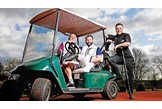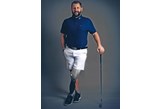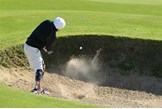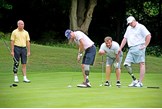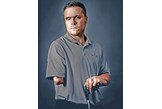Golf is helping injured service personnel get back on track
Published: Last updated:
For most people, golf is just a pastime. For some, it’s a genuine life-saver.
Take former fusilier Tom James, for instance, injured in Afghanistan in 2009 by an improvised explosive device (IED) planted in a tree. Waking from a coma two weeks later, Tom’s journey to recovery would be a long one. The explosion cost him his sight in one eye, necessitated an amputation at his right elbow, and saw him lose several fingers in his left hand. “I had attempted to play golf when I had two arms and two eyes, but I couldn’t hit a ball,” he jokes.
Eighteen months ago, Tom’s recovery officer suggested he contact the On Course Foundation, a charity that uses golf to aid the physical and mental recovery of injured service personnel.

“I went along to a one-day taster event and saw how well others with one arm were hitting the ball. It made me think, ‘If they can hit it like that, why can’t I?’ I stuck with it and I’ve been to nearly every event for the last 18 months.”
The On Course Foundation was the brainchild of John Simpson, former senior vice president of International Management Group (IMG) and erstwhile manager of Nick Faldo, Bernhard Langer, Vijay Singh and Greg Norman. Simpson suffered polio as a child, which curtailed his pursuit of sporting excellence in all his favourite sports other than golf.
“Golf helped me so much throughout my life, and I realised it could really help some of these guys on their road to recovery,” he says. “I wanted to give something back, so it made perfect sense for me to set up the On Course Foundation. It’s fantastic. They come along, not knowing what to wear, what to do, or what the rules are, but thanks to our fantastic coaches, almost everyone hits that ‘wow’ shot in their first hour, and they’re hooked.”
“I taught a world number one [Luke Donald] for five years, and I get more pleasure doing this”
Simpson launched the Foundation in 2010, and it has since helped over 380 wounded, injured and sick service personnel and veterans. “85 per cent had never played golf before,” says managing director Steve Holt. “We give them a one-day introduction to golf, where PGA pros teach them the basics, and if they like it, they attend a three-day session. The intent is to get them to a decent level, so they can join a club and get a handicap.”
PGA Master Professional Alasdair Barr is in charge of the coaching attendees receive. “I taught a world number one [Luke Donald] for five years before he went to America,” he says, “and I get more pleasure doing this.”

The Foundation offers more than just some golf skills and entry into the game. “The proposition is getting them meaningful, full-time employment within the golf industry,” says Holt. “There are 75,000-80,000 jobs in the UK related to golf; servicemen and women have got so many skills that are transferable.
“The average age of guys we come into contact with is 23. If you’re discharged from the army in your mid-20s, you can’t just do nothing for the next 40 or 50 years. It’s quite scary the percentage of homeless people and prison population who are ex-service, because they just haven’t found the right safety net. We can provide that safety net for them.”
“I was going down a slippery slope, into depression. The Foundation gave me a new lease of life”
Thirty-seven-year-old Mike Brown suffered an injury during pre-deployment training in 2013 which eventually led to him having his left leg amputated. “I’d never played golf before, but I fell in love with it at the taster session,” he says. Mike’s passion and sporting prowess (he was an accomplished motocross rider before his injury) have seen him go from novice to an 8-handicap in less than 18 months.
“It’s completely changed my life,” he says. “I was going down a slippery slope, into depression. This has given me a new lease of life. I won the medal at my club at the weekend with a net 66.”

The Foundation has helped secure 12 permanent jobs for ex-service personnel, and Mike is one of over 30 individuals to secure a work placement through the charity. “I’m currently doing a three-month internship in operations management; it’s definitely something I want to get into long-term.”
Not all of the injuries are physical. Andy Stevens served for over 30 years before the array of disturbing things he’d seen caught up with him, resulting in post-traumatic stress disorder (PTSD). “The care you get in the service is very good,” he says, “but once you’re discharged, you’re on your own.
“I started golf a decade before I had my breakdown. The golf course was the only place I could find real peace. There is enough to think about on the course to keep me busy thinking about my game, which stopped me thinking about anything else. I only ever played on my own, though.”
An experienced golfer, Andy was fast-tracked onto a three-day session. “Everyone was so welcoming and non-judgmental. I met other PTSD sufferers and realised that I was not on my own. Having a support network who understand what you’ve been through is incredibly important.”
“It sounds morbid, but I think some of these guys wouldn’t be here if they hadn’t had the chance to make a fresh start through golf”
“The guys tell us the Foundation gives them a reason to get out of bed,” says Holt. “In some cases, it gives them a reason to live. It sounds morbid, but I do think some of these guys wouldn’t be here – due to self-harm – if they hadn’t had the opportunity to make a fresh start through golf.”
The Foundation maintains close links to the United States services, and a Ryder Cup-style match takes place each year. Those selected for the most recent match, at Congressional in 2014, had the honour of meeting Arnold Palmer, who serves as a patron for the charity. “I was profoundly moved by their courage and determination in facing enormous adversity,” says the seven-time Major champion. “To see that our game can be used as an integral tool in the rehabilitation of soldiers from around the world fills me with great pride.”

Andy has found the support network and regularity of events plays a vital role in mediating against the most serious dips in mood. “It stops you dropping too far into depression,” he says. “You’ve always got the next event to look forward to. All of us in the On Course Foundation recognise how good it is for us. As far as I’m concerned, the more people we can get into the Foundation, the better.”
The On Course Foundation’s success in numbers
-
381 members
-
85% had never played golf before their injury
-
80 events since its inception
-
1,000 attendees across all events
-
34 golf work experience placements organised
-
12 full-time jobs secured

